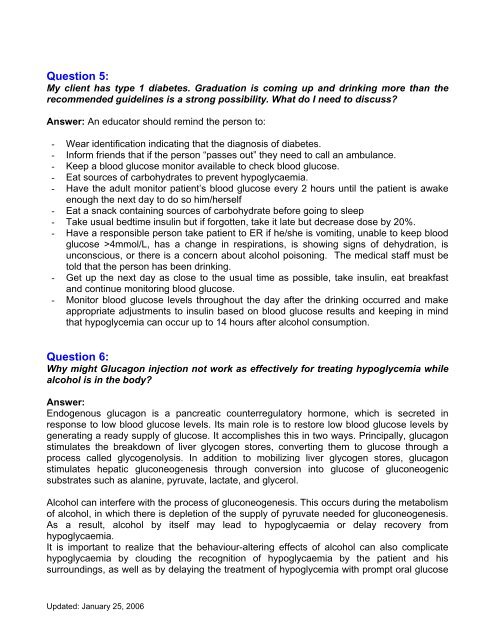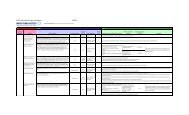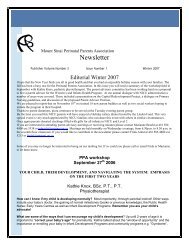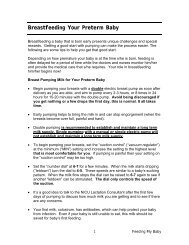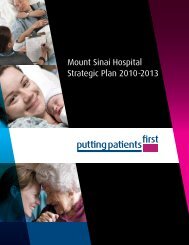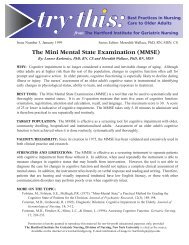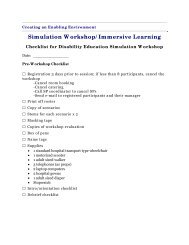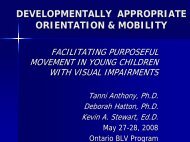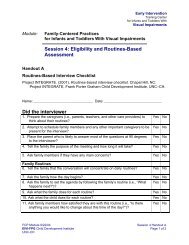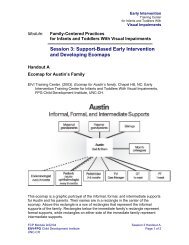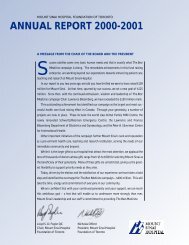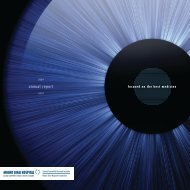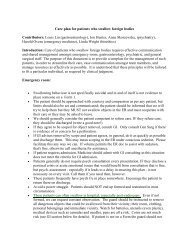Alcohol and Diabetes - Mount Sinai Hospital
Alcohol and Diabetes - Mount Sinai Hospital
Alcohol and Diabetes - Mount Sinai Hospital
Create successful ePaper yourself
Turn your PDF publications into a flip-book with our unique Google optimized e-Paper software.
Question 5:<br />
My client has type 1 diabetes. Graduation is coming up <strong>and</strong> drinking more than the<br />
recommended guidelines is a strong possibility. What do I need to discuss?<br />
Answer: An educator should remind the person to:<br />
- Wear identification indicating that the diagnosis of diabetes.<br />
- Inform friends that if the person “passes out” they need to call an ambulance.<br />
- Keep a blood glucose monitor available to check blood glucose.<br />
- Eat sources of carbohydrates to prevent hypoglycaemia.<br />
- Have the adult monitor patient’s blood glucose every 2 hours until the patient is awake<br />
enough the next day to do so him/herself<br />
- Eat a snack containing sources of carbohydrate before going to sleep<br />
- Take usual bedtime insulin but if forgotten, take it late but decrease dose by 20%.<br />
- Have a responsible person take patient to ER if he/she is vomiting, unable to keep blood<br />
glucose >4mmol/L, has a change in respirations, is showing signs of dehydration, is<br />
unconscious, or there is a concern about alcohol poisoning. The medical staff must be<br />
told that the person has been drinking.<br />
- Get up the next day as close to the usual time as possible, take insulin, eat breakfast<br />
<strong>and</strong> continue monitoring blood glucose.<br />
- Monitor blood glucose levels throughout the day after the drinking occurred <strong>and</strong> make<br />
appropriate adjustments to insulin based on blood glucose results <strong>and</strong> keeping in mind<br />
that hypoglycemia can occur up to 14 hours after alcohol consumption.<br />
Question 6:<br />
Why might Glucagon injection not work as effectively for treating hypoglycemia while<br />
alcohol is in the body?<br />
Answer:<br />
Endogenous glucagon is a pancreatic counterregulatory hormone, which is secreted in<br />
response to low blood glucose levels. Its main role is to restore low blood glucose levels by<br />
generating a ready supply of glucose. It accomplishes this in two ways. Principally, glucagon<br />
stimulates the breakdown of liver glycogen stores, converting them to glucose through a<br />
process called glycogenolysis. In addition to mobilizing liver glycogen stores, glucagon<br />
stimulates hepatic gluconeogenesis through conversion into glucose of gluconeogenic<br />
substrates such as alanine, pyruvate, lactate, <strong>and</strong> glycerol.<br />
<strong>Alcohol</strong> can interfere with the process of gluconeogenesis. This occurs during the metabolism<br />
of alcohol, in which there is depletion of the supply of pyruvate needed for gluconeogenesis.<br />
As a result, alcohol by itself may lead to hypoglycaemia or delay recovery from<br />
hypoglycaemia.<br />
It is important to realize that the behaviour-altering effects of alcohol can also complicate<br />
hypoglycaemia by clouding the recognition of hypoglycaemia by the patient <strong>and</strong> his<br />
surroundings, as well as by delaying the treatment of hypoglycemia with prompt oral glucose<br />
Updated: January 25, 2006


